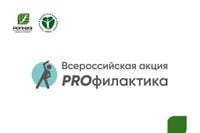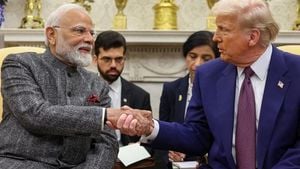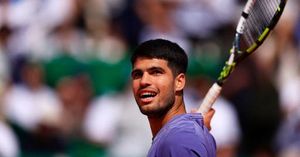As World Health Day approaches, the Chuvash Republic is gearing up for a nationwide campaign titled "Be Healthy!" from April 4 to April 13, 2025. This initiative aims to motivate residents to adopt a healthier lifestyle and foster a conscious attitude towards their health.
Larisa Ageeva, the acting chief freelance specialist in medical prophylaxis of the Ministry of Health of Chuvashia, emphasized the campaign's goal: "Our aim is to inspire citizens not only to actively participate in events but also to integrate healthy habits into their daily lives. This will help reduce the risk of diseases and enhance overall quality of life."
On April 7, 2025, at 12:00 PM, a mass workout will take place in all medical organizations across the Chuvash Republic. This event is organized by the Russian Society for the Prevention of Non-Communicable Diseases (ROPNIZ) in collaboration with the National Medical Research Center for Therapy and Preventive Medicine of the Ministry of Health of Russia. Following that, at 1:00 PM, Russian student teams will host a workout session for students at the Chuvash State University named after I.N. Ulyanov.
In addition to these activities, health schools and flash mob events will be organized in medical institutions, focusing on promoting a healthy lifestyle and preventing chronic non-communicable diseases. Specialists from the Republican Center for Public Health and Medical Prevention, Therapeutic Exercise and Sports Medicine, along with the Chuvash regional branch of the Russian Social Fund, will hold a health day at the Social Fund's department in Chuvashia from 9:00 AM to 12:00 PM on April 7, 2025.
During this event, employees will undergo screenings to identify potential health risks. Participants will have their blood pressure, height, weight, body mass index, and waist circumference measured, along with assessments of muscle strength through dynamometry. Furthermore, glucose and cholesterol levels in the blood will be evaluated, and saturation and carbon monoxide levels will be determined for smokers. Based on the screening results, participants will receive consultations from doctors who will offer health improvement recommendations.
A master class in Scandinavian walking is also scheduled to encourage the adoption of active habits in daily life. Everyone is invited to participate in the All-Russian Dictation on Public Health and Dispensarization, accessible on the website "диктантздоровья.рф". For more information about the event in Chuvashia, details can be found on the website of the Republican Center for Public Health and Medical Prevention, Therapeutic Exercise and Sports Medicine.
Meanwhile, on April 6, 2025, millions around the globe will commemorate the International Day of Sport for Development and Peace. This day, established by the UN General Assembly in 2013, serves as a reminder that sports transcend competition; they are a language of health, peace, and solidarity.
The significance of this date is rooted in history, as it marks the anniversary of the first modern Olympic Games held in Athens on April 6, 1896, which heralded a new era in global sports. The resolution received support from Eastern European countries and the post-Soviet space, including Romania, Russia, Kazakhstan, and Serbia. Notable figures such as Jacques Rogge, then-president of the International Olympic Committee (IOC), and world tennis champion Novak Djokovic spoke at the UN meeting where the date was established.
The UN acknowledges that sport can promote social integration, strengthen solidarity, and instill universal values such as justice, teamwork, discipline, and respect for opponents and rules. The Paralympic movement plays a crucial role in dismantling stereotypes surrounding individuals with disabilities.
Physical activity is vital for maintaining health throughout life. Even small changes, like opting for stairs instead of elevators or taking brief walks during the day, can positively impact health. Regular exercise tailored to age and individual needs enhances well-being, boosts energy, and prolongs active longevity.
For children and adolescents aged 5 to 17, at least 60 minutes of moderate to vigorous physical activity daily is recommended, as it strengthens bones, develops muscle mass, improves coordination, and reduces the risk of chronic diseases in the future. Activities can include games, sports, dancing, and other engaging pursuits.
Adults aged 18 to 64 should aim for a minimum of 150 minutes of moderate-intensity aerobic physical activity or 75 minutes of vigorous intensity each week. This could involve brisk walking, swimming, cycling, or running. Additionally, muscle-strengthening exercises should be performed at least twice a week to mitigate the risk of cardiovascular diseases, type 2 diabetes, and certain cancers.
Older adults aged 65 and above should target 150 to 300 minutes of moderate aerobic activity weekly, such as walking, gardening, or dancing. It's also essential to incorporate balance and coordination exercises to prevent falls, along with strength training to maintain muscle mass and bone density.
The popularity of sports in Kazakhstan reflects a significant aspect of national identity. Football remains the leading sport, with over 1 million 63 thousand participants engaged at amateur and semi-professional levels. Approximately 17 thousand football sections across the country affirm its status as the most popular sport, characterized by its accessibility and straightforward rules.
Volleyball follows closely, captivating around 766 thousand individuals, with approximately 16 thousand volleyball sections in the nation. This sport is particularly favored among students and youth, as it fosters coordination, agility, and teamwork.
Boxing holds a revered place in Kazakhstan's sports culture, with a legacy established by champions like Gennady Golovkin and Bekzat Sattarkhanov. The sport is not just a pastime but a source of national pride, evidenced by numerous medals won at world championships and the Olympics.
In recent years, cycling has surged in popularity, bolstered by the achievements of athletes like Alexander Vinokourov. The country is enhancing its cycling infrastructure, promoting biking as a means of fitness, transport, and leisure.
National sports also play a vital role in Kazakhstan's athletic culture. Togyzkumalak, a strategic board game akin to chess, boasts over 6,800 clubs with more than 200,000 participants, fostering strategic thinking among youth.
Traditional Kazakh wrestling, known as қазақ күресі, is actively practiced, with over 150,000 individuals participating in wrestling sections nationwide. Tournaments attract thousands of spectators, and winners of major championships receive prizes commensurate with professional fighters.
As sports evolve, the integration of technology, data analytics, and artificial intelligence is reshaping the landscape. Modern footwear like Nike Adapt and Under Armour HOVR can monitor speed, stride length, and joint loads, transmitting data to mobile applications. Wearable technology, including biosensor-equipped clothing, records vital health metrics in real-time.
AI applications in fitness, such as Freeletics or Whoop, personalize training regimens based on user data, while virtual and augmented reality are revolutionizing athlete training and rehabilitation, allowing athletes to practice in simulated environments.
As the world prepares to celebrate both World Health Day and the International Day of Sport for Development and Peace, the emphasis on healthy living and the unifying power of sports remains more relevant than ever.





